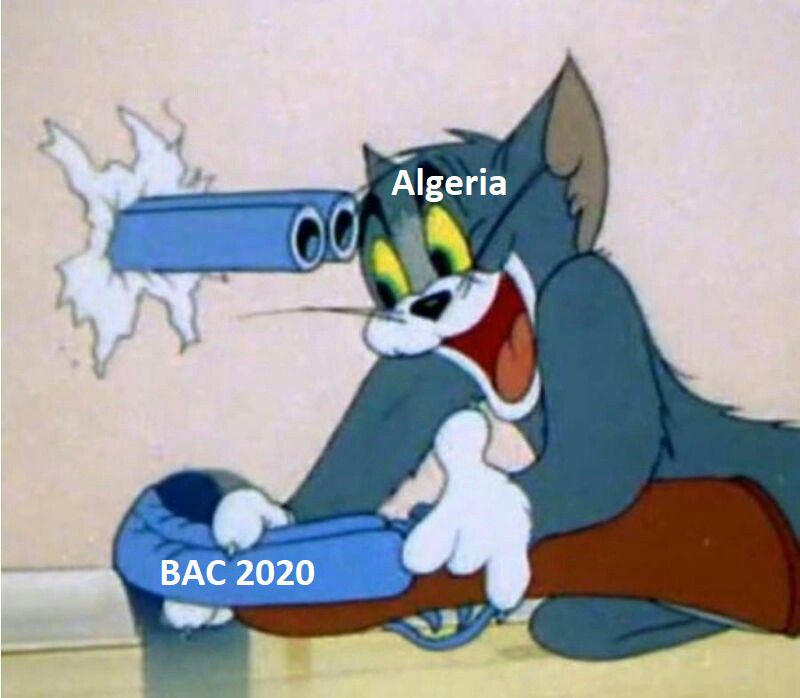
How a whole country is shooting itself in the head
 8 min
8 min
How a whole country is shooting itself in the head
It has been one week since the results of the “Baccalaureate” exam were announced in Algeria, and without surprise, it was a mess.

Following my last week’s article and since I grew up and lived my whole life in Algeria, it is best for me to give its educational system as a concrete example since I am not really familiar with other countries.
In Algeria, you go through three major phases before getting to college: primary, middle, and high school. You go to primary school at the age of 6 (switched now to 5), and you spend there 6 (switched now to 5) years, then you have 4 years in middle school, and 3 in high school, and during your 3rd year, you have a nationwide exam, usually in early June, called the Baccalaureate (or BAC) where you have between 8 to 10 exams depending on your major and your performance is a weighted average out of 20 of your performance on each subject, which brings me to the purpose of this example.
In Algeria, your whole career and adulthood life is based on a 5-days performance, which is not something shocking (or is it?), but the problem is when the exam subjects you are offering are relatively easy (usually for political reasons, to buy the “social peace”) in a way that the distribution of the results is bi-modal, in other words, you have a big sample of pupils who get very good results and on the other side you get pupils who have average results.

In a supply and demand model, based on the performance, priority, and the list of universities/schools a pupil will choose, the top ones will usually get their first choice, and the less-fortunate ones get their second, and so forth, which does not seem so crucial given the fact that we need a scale to compare things, and life is not always fair, but this year, it was the last nail for our educational system’s coffin. Due to the pandemic, schools shut down and pupils did not have courses since last Spring, and we do not have the infrastructure to study from home, so the government took the option to postpone the exam until September. So in theory (I know that during a pandemic, it is not obvious to study), you have more time to prepare for the exam and also fewer courses, so even if you are an average student but with a good will and manage to have good preparation, you can perform well. And without surprise, that is what happened:

Let me explain the picture below: this person got a 16.02 out of 20 in technical mathematics major, his first choice was med school, but the acceptance score is 17.03 but since his major has 3rd priority that was expected, his second choice is what technical mathematics students choose, and last year it stopped at 16.27 and 16.77 for first and second priorities, and in theory, he could still hope to get there if it was not for this year’s fiasco, instead, he got his 9th choice that he probably put “just to fill” (we could have a whole discussion about this) his 10 choices, being confident that it probably will not get to that. Now, this probably not a very insightful way to present it but imagine now the range, statistically speaking, which is a whole 7 point range, meaning that the level of students could be very different which would reduce the quality of education, and that there is a whole spectrum of scores that could be in the same situation of bad predictions and not having access to most of their choices. In my opinion, some of the reasons that led to these bad predictions could be:
- New students have no prior knowledge about what would college look like and they got no preparation for how to make good choices and choose the career that would fit them, they learn that the hard way just, like John Wayne teaches swimming.
- No regulations for the job market, meaning that there is no organism (or it exists but with no real effect) that is responsible for following and providing numbers and statistics for how many computer engineers the industry needs per year during the next 10 years for example.
- No real initiatives for industry collaboration systems between academic/research institutes and the private sector.
But I think that the real issue here is that we were, unfortunately, for a long period of time, a country led by a lot of informalities, and we lacked the environment to grow intellectually, and that made our society’s perception of success highly biased: if you do not choose a medical, computer science or a technical field, you are not going to succeed. I get that most societies have certain preferences for certain domains (this may shock you but law careers are for the ones who do not do well in BAC as opposed to the U.S. ecosystem where it is prestigious to study law), but the sad thing about us is that once you get to college, your first goal is to get out of the country because you know that your career will not advance, and that is another story that we may let for another article. But before ending, I would like to mention that this lack of vision from our leaders is breaking dreams and pushing young students to study abroad and be far from their families and homes, which is very unfortunate given the potential they have and the added value they can bring.
In the end, I just want to highlight that even if the system is not perfect, we had very brilliant scientists and engineers coming out of it, but I think mostly because of their individual efforts, and because they saw the cup half full, and during the recent years, things started to change, hopefully for the better, and we saw some initiatives that should be popularized more. But everyone should make an extra effort, knowing that we probably will not live to see the results, but at least we would provide a better life for the future generations, and I am speaking in particular to my fellow Algerian elite because I think they are more concerned about the topic, and concern can be the fuel, here is a say by Steve Jobs that I really like where he was talking about consulting jobs, but it could be applied to the context of being a passive person:
I think that without owning something over an extended period of time, like a few years, where someone has a chance to take responsibility for one’s recommendations, where one has to see one’s recommendations through all action stages and accumulate some scar tissue for the mistakes and pick one’s self up off the ground and dust one’s self off, one learns a fraction of what one can
Given that I am no expert in education, and I probably did not mention some points, so questions and opinions are more than welcome to cover the missing parts and help me see things from different angles, and I hope this will not be the last article about education.









 English
English
 Français
Français
 Deutsch
Deutsch
 Italiano
Italiano
 Español
Español



 Contribute
Contribute









 You can support your favorite writers
You can support your favorite writers






Julien Guyomard 4 years ago
"This may shock you but law careers are for the ones who do not do well in BAC as opposed to the U.S. ecosystem where it is prestigious to study law".
Very surprising and interesting because it means that prestige and what we value is relative to the society you live in.
I've got that feeling that it's changing in France where being a lawyer or a physician, mayor isn't as prestigious as it used to be.
Amine Riad Remache 4 years ago
Exactly, another example is computer science engineers, they are seen as people that can only fix your computer, ignoring the fact that the current IT infrastructure is more than computers.
Julien Guyomard 4 years ago
I'll use it in my next article ! :) thanks for sharing